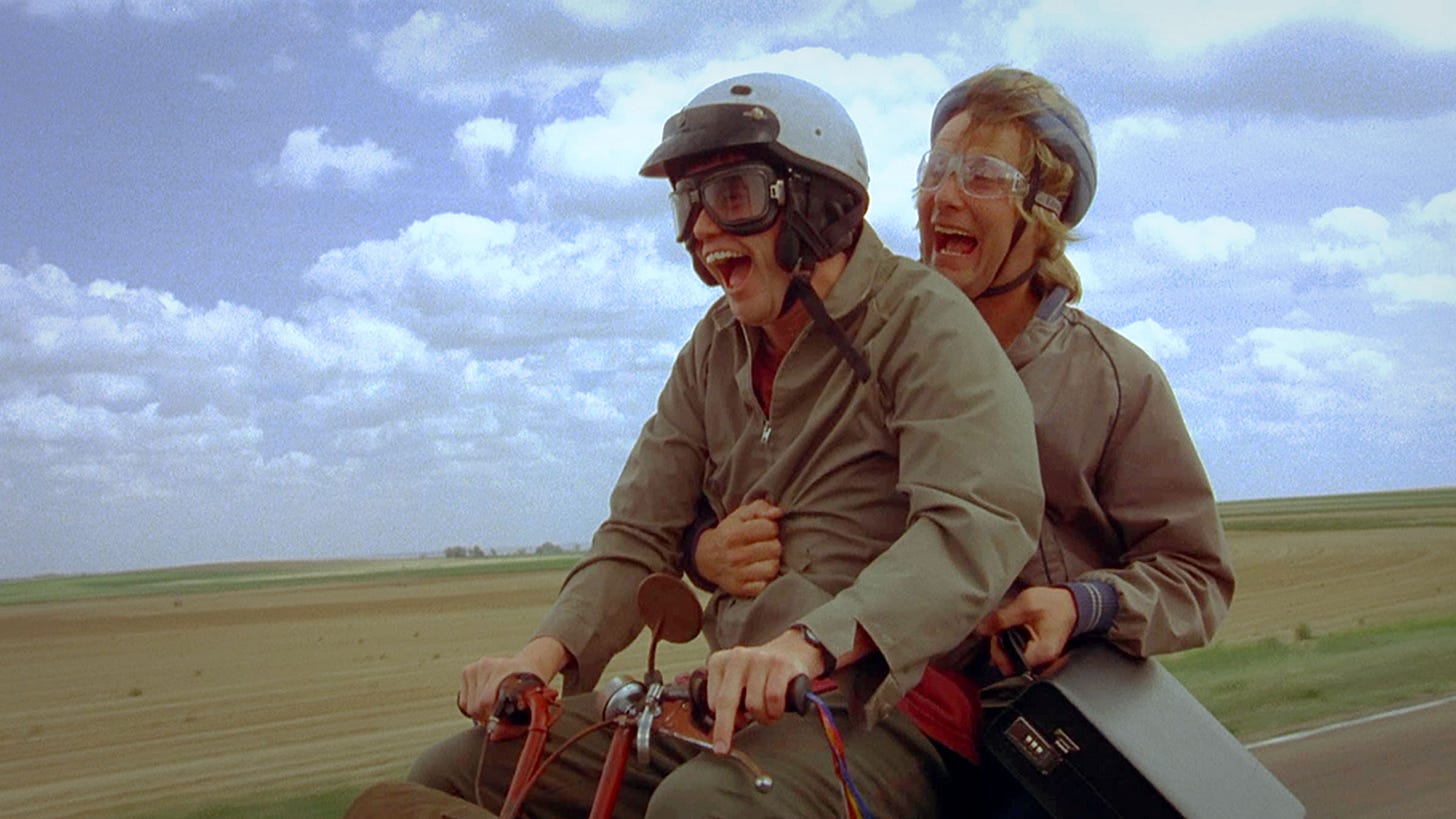The stupidity of 'Dumb and Dumber' is evergreen
Revisiting 1994's Jim Carrey/Jeff Daniels classic
I planned to revisit Dumb and Dumber for its 30th anniversary, rounding out my look at Jim Carrey’s breakout 1994 (Ace Ventura, The Mask). But its December release collided with end-of-year critic duties, and time slipped away. Instead, I watched it with my son the weekend he turned 13, making it a fitting milestone movie. And honestly, that was the perfect way to return to it. After all, what is Dumb and Dumber but a movie filtered through a middle school sensibility?
I was slightly older than Mickey when it debuted — 15 when Harry and Lloyd set off for Aspen (California or France, depending on who you believe). I saw it opening day with my brother and cousin (both Mickey’s age), and I’d never laughed harder in a theater. Every line was quotable, every gag a gut-buster. Jeff Daniels’ bathroom disaster? I could barely breathe from laughing.
Mickey had the same reaction, knowing little beyond Jim Carrey from Sonic the Hedgehog. He doubled over at the same beats, proving Dumb and Dumber remains timeless in its sheer, primal idiocy. For Gen X teens, it was on the comedy Mount Rushmore. We quoted it endlessly (I still drop “Big Gulps, huh? Well, see ya later”). It cemented the Farrelly Brothers as comedy powerhouses and solidified Carrey as our generation’s Steve Martin. But how does it hold up in a post-Apatow/Ferrell/Rogen world?
Pretty damn well. It’s still the best-aged of Carrey’s ‘94 comedies — not perfect, but smartly stupid. Unlike an Adam McKay satire, there’s no deeper commentary on male bravado; it’s just a relentless gag machine with a shockingly high hit rate. The Farrellys carefully construct idiocy, where even minor throwaway lines — like Lloyd’s deadpan, “They’ve got the Monkees. They were a major influence on the Beatles” — are comedy gold.
Carrey, originally considered alongside Steve Martin, Martin Short, and even Gary Oldman (!), got the gig post-Ace Ventura and leveraged it into a $7 million payday. And while Ace is pure chaos and The Mask alternates between cartoonish and bland, Dumb and Dumber is his most balanced performance. Lloyd is the perfect Carrey character — absurd but weirdly endearing. He sells idiotic lines with precision, and his rare moments of sincerity (“I’m tired of eking my way through life”) give him just enough humanity.
Daniels, absurdly underpaid at $50,000, is just as crucial. He sells Harry’s cluelessness with such commitment that he might out-dumb Carrey. His ski-date montage with Mary — misusing a snowman’s facial features, escalating a snowball fight — is a masterclass in physical comedy. His gas-station flirtation (“Skis, huh? They yours? Both of them?”) and futile attempt to stay cool as his feet ignite are among the film’s funniest moments.
Harry and Lloyd are overgrown middle schoolers — emotionally and intellectually — which is why 13-year-olds lock onto this movie. Yes, some moments haven’t aged well, but they remain more innocent than malicious. Unlike Step Brothers, which finds humor in the horror of men-child arrested development (and a movie I’d argue is better), Dumb and Dumber revels in absurdity.
The Farrellys’ golden run (Dumb and Dumber, Kingpin, There’s Something About Mary) burned bright, but nothing quite matched that peak. Their later films felt looser, though Peter went on to Green Book, and they recently teamed up for Dear Santa.
Still, their debut showed impeccable comedic instincts. The precision of their stupidity is unmatched. The escalating gags, impeccable timing (like the slow build of Lloyd’s “most annoying sound in the world” bit), and relentless joke layering prove that even dumb comedy requires intelligence. The film’s a bit long, but it flies by on a high-energy ‘90s soundtrack.
Watching it again, I laughed as hard as ever. More importantly, I got to experience it through my son’s fresh eyes, confirming that stupidity — when done this well — is eternal.



